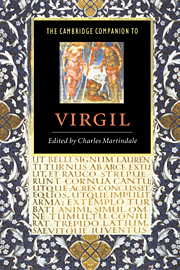Book contents
- Frontmatter
- Contents
- List of illustrations
- List of contributors
- Preface
- 1 Introduction: ‘The classic of all Europe’
- Part 1 Translation and reception
- Part 2 Genre and poetic career
- 8 Green politics: the Eclogues
- 9 Virgilian didaxis: value and meaning in the Georgics
- 10 Virgilian epic
- 11 Closure: the Book of Virgil
- Part 3 Contexts of production
- Part 4 Contents and forms
- Dateline compiled by Genevieve Liveley
- List of works cited
- Index
- Plates
8 - Green politics: the Eclogues
from Part 2 - Genre and poetic career
Published online by Cambridge University Press: 28 May 2006
- Frontmatter
- Contents
- List of illustrations
- List of contributors
- Preface
- 1 Introduction: ‘The classic of all Europe’
- Part 1 Translation and reception
- Part 2 Genre and poetic career
- 8 Green politics: the Eclogues
- 9 Virgilian didaxis: value and meaning in the Georgics
- 10 Virgilian epic
- 11 Closure: the Book of Virgil
- Part 3 Contexts of production
- Part 4 Contents and forms
- Dateline compiled by Genevieve Liveley
- List of works cited
- Index
- Plates
Summary
It may have been at the suggestion of his patron Asinius Pollio, aristocratic promoter of the new poetics which began with the generation of Catullus, that Virgil undertook to become the Roman Theocritus. At all events his decision to imitate a collection of sophisticated Hellenistic literary experiments, and in the process to 'pastoralise' them (only a minority of the Idylls have a rustic setting), was to have important and unexpected consequences. Without the Eclogues pastoral might never have become one of the major, exemplary genres of European poetry. E. R. Curtius declared that anyone unfamiliar with the First Eclogue 'lacks one key to the literary tradition of Europe'; while for Paul Alpers the collection constitutes 'probably the single most important document in the history of poetry'. Moreover Virgil's canonical status and the eventual shape of his poetic career as it appeared in retrospect, with its apparently purposeful upward march through the genres, meant that pastoral became an appropriate point d'appui for a youthful poet with aspirations for immortality; both Spenser and Milton, for example, consciously shaped their artistic lives to the Virgilian example.
- Type
- Chapter
- Information
- The Cambridge Companion to Virgil , pp. 107 - 124Publisher: Cambridge University PressPrint publication year: 1997
- 13
- Cited by



